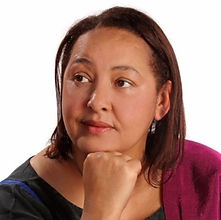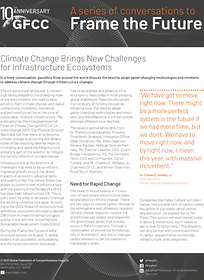PUBLICATIONS

Frame the Future
Conversation Series
The Global Federation of Competitiveness Council (GFCC) hosted eleven conversations defined by five future-defining attributes: innovation, partnership, resilience, inclusiveness, and sustainability. For the GFCC, these attributes are interconnected and must be applied simultaneously to drive future strategies into a truly transformative agenda.
Throughout these conversations, policymakers, CEOs, researchers, entrepreneurs, government and civil society leaders gathered to share insights and expertise on ten subjects: innovation, talent, intellectual property systems, infrastructure, public-private partnerships, regulations, local development, natural assets, trade & global partnerships, and benchmarking.
Below you can find a brief recap, teaser video, post-event video, post-event report, list of panelists, a list of resources, and the full video for each individual session. You are also able to jump directly to the session of your interest by choosing one of the options below.
Opening Session | Innovation | Talent | Intellectual Property Systems | Infrastructure | Public-Private Partnerships | Regulation | Local Development | Natural Assets | Trade & Global Partnerships | Benchmarking
Frame the Future Guidelines and Recommendations for Future Competitiveness
The report gathers best practices, trends, and recommendations related to the ten strategic competitiveness areas covered in the GFCC Global Competitiveness Principles.
It also informs the trends shaping the future of innovation, sustainability, resilience, and inclusiveness and provides concrete and actionable steps for leaders to take action.

Frame the Future
Session #1: OPENING
Five future-defining features will guide the conversations throughout the Frame the Future series: innovation, partnership, resilience, inclusiveness, and sustainability.
These attributes are interconnected and must be applied simultaneously to drive future strategies into a truly transformative agenda.
They will also help map out strategic issues and interdependencies across the ten competitiveness areas based on the GFCC Global Competitiveness Principles framework.
Session Speakers - Opening

Socrates Lazaridis
CEO - Athens Exchange Group
Greece

Mohd Yusoff Sulaiman
President & CEO, Malaysian Industry-Government Group For High Technology (MIGHT)
Malaysia

Gianna Sagazio
Innovation Director, Brazilian National Industry Confederation (CNI)
Brazil

Alfred Ongere
Managing Director, Mind Intelligence Ltd; Founder, AI Kenya
HOST

Chad Holliday
Chairman, GFCC; Former Chairman Shell, DuPont and Bank of America
USA

Deborah L. Wince-Smith
President, Global Federation of Competitiveness Councils (GFCC), President & CEO, Council on Competitiveness (CoC)

Roberto Alvarez
Executive Director - Global Federation of Competitiveness Councils (GFCC)
Session Video Clip - Opening
Full Session Video - Opening
Post Event Report - Opening

Session Thought Pieces




Session Cases & References - Opening
Regional Comprehensive Economic Partnership (RCEP)
The Regional Comprehensive Economic Partnership (RCEP) Agreement is an agreement to broaden and deepen ASEAN’s engagement with Australia, China, Japan, Korea and New Zealand. Together, these RCEP participating countries account for about 30% of the global GDP and 30% of the world population. The objective of the RCEP Agreement is to establish a modern, comprehensive, high-quality, and mutually beneficial economic partnership that will facilitate the expansion of regional trade and investment and contribute to global economic growth and development. Accordingly, it will bring about market and employment opportunities to businesses and people in the region. The RCEP Agreement will work alongside and support an open, inclusive, and rules-based multilateral trading system.
Link: https://asean.org/summary-regional-comprehensive-economic-partnership-agreement/
Malaysia’s National Technology & Innovation Sandbox Initiative
National Technology and Innovation Sandbox (NTIS) is a facility that allows researchers, innovators, startups and high-tech entrepreneurs to test their products, services, business models and delivery mechanisms in a live environment.
Link: https://sandbox.gov.my/
Free the Seed Sdn. Bhd.
An enterprising firm in Malaysia addressing a problem unwittingly created by farmers burning rice straw when they are preparing their soil. Free the Seed Sdn. Bhd. a company which is converting rice straw and husks into biodegradable packaging. The company uses its patented biotechnology process, utilizing protease serene enzymes, delignified cellulose fibers and enzymatic gratification methods, to produce packaging products that once used organically compost within six months.
Frame the Future
Session #2: INNOVATION
Innovation is a key driver for future growth. We need innovation to build sustainable, resilient, and inclusive businesses, urban systems, and economies.
At the same time, these three imperatives forge massive opportunities to create new value. The session surveyed how sustainability, resilience, inclusiveness, and partnership can simultaneously be translated and addressed through innovation strategies.
We displayed concrete solutions, models, programs, initiatives, and cases that can serve as models for leaders and citizens interested in framing the future of innovation.
Session Speakers - Innovation

Ghadah Al-Dabbagh
Head of the Omnipreneurship Lab, Al-Dabbagh Group Saudi Arabia

Jaime Alvarez
Head of Future Studies, National Council of Innovation for Development (CNID) Chile

William Lese
Managing Partner, Braemar Energy Ventures - USA

Hiro Nishiguchi
CEO, Japan Innovation Network
Japan
HOST

Ken Sloan
Deputy Vice-Chancellor and Senior Vice-President, Monash University
Australia

Deborah L. Wince-Smith
President, Global Federation of Competitiveness Councils (GFCC), President & CEO, Council on Competitiveness (CoC)

Roberto Alvarez
Executive Director - Global Federation of Competitiveness Councils (GFCC)
Full Session Video - Innovation
Session Video Clip - Innovation
Situation Paper - Innovation
Post Event Report - Innovation


Session Thought Pieces


Frame the Future
Session #3: TALENT
Human capital is the backbone of any economy. It is the people, with their capacities, capabilities, and skills, that lead nations and perform the tasks needed for business to thrive. Today, talks about talent development occupy a central stage because every country in the world is dealing with a skills shortage.
At the same time, increased global connectivity can enable governments and organizations to mobilize talent at scale and speed from virtually everywhere to solve global challenges and foster a positive impact. This conversation analyzed the main trends in the talent landscape and potential future opportunities.
The GFCC launched a new report during the session, Future Skills: Lessons and Insights from a Review of Innovative Skills Development Initiatives.
Session Speakers - Talent

Isabelle Christina
Ashoka Young Changemaker Founder, Black Girls Project, Program Ambassador, Unicef Brazil

Isabel Gil
Rector, Universidade Católica Portuguesa
Portugal

Michael Fung
Deputy Chief Executive, SkillsFuture
Singapore

Chad Holliday
Chairman, GFCC;
Former Chairman Shell, DuPont and Bank of America
USA
HOST

Aleksandar Subic
Deputy Vice-Chancellor (STEM College) & Vice President Digital Innovation - RMIT University
Australia

Deborah L. Wince-Smith
President, Global Federation of Competitiveness Councils (GFCC), President & CEO, Council on Competitiveness (CoC)
HOST

Roberto Alvarez
Executive Director - Global Federation of Competitiveness Councils (GFCC)
Session Video Clip - Talent
Full Session Video - Talent
Situation Paper - Talent

Post Event Report - Talent

Session Thought Piece

Session Cases & References - Talent
SkillsFuture movement
https://www.skillsfuture.gov.sg – info and links to range of initiatives/programs
Skills Frameworks
https://www.skillsfuture.gov.sg/skills-framework - open access to set of frameworks for different industries Some Relevant Publications
Paradigm shifts for education and training
https://doi.org/10.1007/978-981-16-0983-1_14
Foundations for Asia's digital workforce
https://www.businesstimes.com.sg/opinion/laying-the-foundations-for-asias-digital-workforce
Lifelong learning
Philippines Skills Framework Development
https://www.pressreader.com/philippines/the-freeman/20210630/281762747233865 - https://www.dti.gov.ph/speeches/launch-of-the-philippine-skills-framework-initiative/ - https://fb.watch/6rnRcTJVie/
ADB Industry 4.0 in Southeast Asia
https://www.adb.org/news/events/adb-study-industry-4-southeast-asia
World Bank
https://olc.worldbank.org/content/knowledge-exchange-singapore-0
Frame the Future
Session #4: INTELLECTUAL PROPERTY SYSTEMS
Intellectual property (IP) lays the foundation for the innovation economy. It allows artists, scientists, creators, and businesses to commercially benefit from their original work, incentivizing creativity and competitiveness. In recent years, technological advancements have added a new emphasis to IP policies and strategies. Trends related to open innovation and collaboration challenge available mechanisms, demanding new models to pursue collective creations. Artificial Intelligence (AI) is also pushing a revolution in the field, and IP systems still need to catch up with regulations for computer-generated inventions.
Session Speakers - Intellectual Property Systems

Gulay Ozkan
Design lead, EU Maturolife and Founder, GEDS
Turkey

Paul Roben
Associate Vice Chancellor-Office of Innovation and Commercialization, University of California San Diego
U.S

Claudio Furtado
President, National Institute of Industrial Property
Brazil

Christopher Geiger
Enterprise Rise and Sustainability Director, Lockheed Martin
U.S.

Noam Shemtov
Deputy Head of the Centre for Commercial Law Studies, Queen Mary University of London
UK

Deborah L. Wince-Smith
President, Global Federation of Competitiveness Councils (GFCC), President & CEO, Council on Competitiveness (CoC)

Roberto Alvarez
Executive Director - Global Federation of Competitiveness Councils (GFCC)
Session Video Clip - Intellectual Property Systems
Full Session Video - Intellectual Property Systems
Situation Paper - Intellectual Property
Systems

Post Event Report - Intellectual Property Systems

Session Thought Pieces



Session Cases & References - Intellectual Property Systems
Frame the Future
Session #5: INFRASTRUCTURE
Every country depends on infrastructure to function appropriately and cost-effectively and to provide basic living standards to its populations. Investments in energy, transport, water management systems, and telecommunications are crucial to drive future prosperity and advance the United Nations Sustainable Development Goals. Today, economies across the globe struggle to finance infrastructure needs. Estimates show a 15 trillion-dollar gap in investments in the sector beyond commitments already announced by governments and through Public-Private Partnerships. Innovation, sustainability, resilience, and inclusiveness will be imperatives to optimize the design of future systems and bridge current gaps.
Session Speakers - Infrastructure


Chad Holliday
Chairman, GFCC; Former Chairman Shell, DuPont and Bank of America
U.S.

Elisa Jagerson
General Partner, Wildcat Venture Partners
U.S.

Mahmoud Samir Abdulwahed
Director of President's Strategic Innovation Office, Qatar University
Qatar

Pia Henrietta Moon
CEO & Co-Founder, Carbo Culture
Finland
.jpeg)
Frannie Leautier
Senior Partner at SouthBridge Group and CEO of SouthBridge Investments
France

Deborah L. Wince-Smith
President, Global Federation of Competitiveness Councils (GFCC), President & CEO, Council on Competitiveness (CoC)

Roberto Alvarez
Executive Director - Global Federation of Competitiveness Councils (GFCC)
Session Video Clip - Infrastructure
Full Session Video - Infrastructure
Post Event Report - Infrastructure

Session Thought Pieces


Frame the Future
Session #6: PUBLIC-PRIVATE PARTNERSHIPS
Public-Private Partnerships (PPPs) are essential for the advancement of economies and societies. Partnerships between the public and private sectors help develop local and national economies and increase global progress. Effective PPPs involve exchanging information, the circulation of resources and talent, risk-sharing, joint investment, and transparency. They are enabled by the alignment of interests, trust, and clear and stable rules of engagement. A critical aspect of this conversation is the nature and configuration of PPPs and building them to foster a positive and lasting impact.
Session Speakers - Public-Private Partnerships


Lori Schmidt
President, Loral Management Group
Canada

Anuar Buranbayev
Managing Partner, Center for Research and Consulting, LLP
Kazakhstan

Eduardo Jorge Oliveira
Head of the Center for Strategic Technologies in Health, Paraiba State University
Brazil

Tapiwa Chiwewe
Senior Research Manager and Program Director, IBM Research
South Africa

Deborah L. Wince-Smith
President, Global Federation of Competitiveness Councils (GFCC), President & CEO, Council on Competitiveness (CoC)

Roberto Alvarez
Executive Director - Global Federation of Competitiveness Councils (GFCC)
Session Video Clip - Public-Private Partnerships
Full Session Video - Public-Private Partnerships
Post Event Report - Private-Public Partnerships

Session Thought Piece




